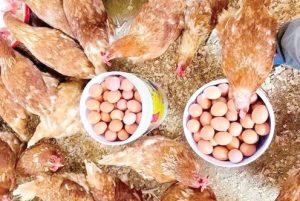Welcome to Dormaa Ahenkro – Ghana’s Egg City

The Dormaa area, comprising the Dormaa Central Municipality, Dormaa East and Dormaa West districts, is well known as a major producer of poultry products.
It, therefore, plays a significant role in the country’s poultry value chain and has thus claimed the top spot as the leader in the country’s poultry industry.
Egg city
Dormaa Ahenkro, home to the royal residence of the Dormaahene and the traditional seat of the Dormaa people, is more than just a royal town.

Poultry birds with eggs
It is Ghana’s undisputed Egg City, renowned for its thriving poultry industry and rich egg-producing heritage—a legacy that earned it this proud accolade.
Not only does the Dormaa area enjoy a continuous abundance of fresh eggs, but it also never runs out of poultry products, and the industry continues to flourish, although the country is currently experiencing some challenges in its poultry industry.
At a recent meeting with the Regional Minister, Joseph Addae Akwaboa, at the Abanpredease Palace, the Dormaa Twafohene, Barimah Twumasi Bekoe, said 70 per cent of the estimated 90 per cent of farmers in the area were poultry farmers.
At Ghana’s Egg City and its adjoining communities, there are several poultry farms, which employ hundreds of people in the area.
The area has more than 300 registered members of the Dormaa Poultry Farmers Association, and includes females who are mostly into the commercial production of layers and broiler birds.
Poultry heartbeat
At peak production, members of the association churn out vast quantities of egg crates daily, making the area—and the Bono Region—the heartbeat of Ghana’s poultry industry.
The Dormaa area alone produces half of the country’s poultry products, as some poultry farms produce more than 3,000 crates of eggs per day.
This attracts several traders from all parts of the country, including neighbouring La Côte d’Ivoire, to transact business in the area.
It’s interesting to note that on some occasions, poultry farmers do not even get buyers to purchase their eggs because of the unprecedented glut in egg production in the area.
Industry challenges
Notwithstanding the prospects of the poultry industry in the Dormaa area, farmers who spoke to the Daily Graphic expressed concern about the high cost of production.
A poultry farmer, Patrick Adu, said the high cost of feeding and other inputs was negatively affecting their production.
He said if the sector was properly managed, it could halt the youth from engaging in illegal mining or migrating to cities such as Accra in search of non-existent jobs.
Another farmer, Samuel Oppong, said the importation of poultry products was also denying poultry farmers their profit.
He urged the government to take a bold decision to place a ban on the importation of poultry products into the country.
“Sometimes, we do not get buyers for our eggs, and this is gradually compelling some of the farmers to divert into the production of broilers,” Mr Oppong explained.
Factory
A female poultry farmer, Juliet Owusuaa, appealed to the government to complete the two abandoned poultry processing factories at Nseseresu and Asuhyiaye to improve the industry.
She also called on the government to support them with quality feed, incentives and loans to sustain their operations or save the industry from collapsing.
An egg seller at Dormaa Ahenkro, Vida Benewaa, said the price of a crate of eggs depended on its size.
She explained that it was between GH¢45 and GH¢55, depending on the size of the eggs.



